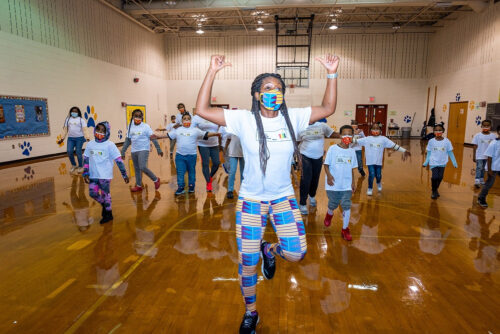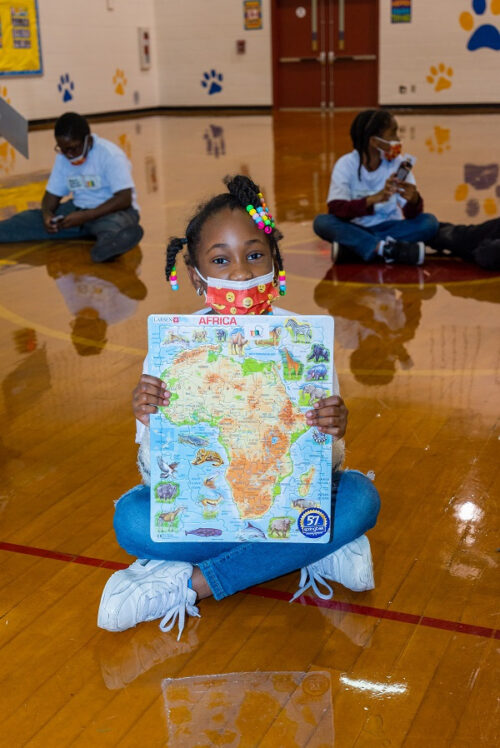Nonprofits
Sharing Culture and Pride: Tidewater African Cultural Alliance

Rita Addico Cohen’s family moved to Hampton Roads in 1982 from their native Ghana when she was eight years old. At her new Norfolk school, Cohen was “happy to see kids who looked like me. I assumed they were from Ghana, too,” she recalled thinking about her Black classmates.
However, Cohen’s classmates had never heard of Ghana, its culture, and its customs. Cohen said students laughed at her accent, and she struggled to understand their southern accents and American ways. Forty years later, Cohen still remembers the sting of culture shock.
Cohen said her childhood experience “planted a seed in my head” that inspired her in 2017 to found the nonprofit Tidewater African Cultural Alliance (TACA). The Virginia Beach resident’s goal is to instill knowledge and an appreciation of Africa’s 54 diverse countries among people “who come from different places and don’t understand each other.”
TACA, which is a Black-led nonprofit, sponsors cultural events for all ages that highlight music, dance, and food from specific African countries. It added children’s programs in 2021 with help from a three-year, $15,482 grant from the Hampton Roads Community Foundation. The grant funds weekly African storytime for children ages 5 through 12 in Chesapeake at the Thurgood Marshall Boys & Girls Club and ForKids Center for Children and Families.

Cohen, TACA’s executive director, is a University of Virginia and Manhattan School of Music graduate who worked as a professional opera singer and Zumba instructor. At TACA, she created a curriculum that blends storytelling with music, dance, geography, and languages. Students spend an hour each week learning about specific African countries for three months.
On a recent Friday afternoon at the Boys & Girls Club at Thurgood Marshall Elementary School, Cohen and a TACA assistant transported 28 children to Nigeria. In previous months, weekly sessions highlighted South Africa. Coming next will be a focus on Ghana.
“It’s good for children to learn about different cultures and languages,” said Lea McMinnon, the Thurgood Marshall Boys & Girls Club site manager. McMinnon said many of the children in the program haven’t had an opportunity to travel much due to economic hardships. “Some kids here have never been out of Chesapeake.”
Dressed in a T-shirt, colorful yoga pants, and athletic shoes, Cohen passed around a large map of the African continent as each child pointed to the country of Nigeria. She challenged children to recall what they had learned in previous weeks. Hands flew in the air as children vied to name Nigeria’s capital (Abuja) and some of its 500 languages, including Igbo, English, Hausa, and Yoruba.

Cohen quizzed students about the Nigerian flag (green for land and white for peace) and key facts about the country (most populous in Africa and renowned for its oil and minerals). She surprised children with a new fact: Nigeria creates more movies than the United States and is second only to India in worldwide movie production.
Students listened intently as Cohen taught them Yoruba words for “sun, moon, and water” (“oorun, osupa and omi”). As Cohen told the Nigerian folktale Why the Sun and Moon Live in the Sky, children shouted out the three Yoruba words when they heard Cohen say them in English. Afterward, students recounted the morals they learned from the story:
“Listen and think before you say something,” a girl said.
“Trust people when they tell you something,” a boy added.
The program ended with many students’ favorite part – dancing. They imitated Cohen’s energetic V steps and other moves as they stomped, marched, and swung their arms to a song by Yemi Alade, a contemporary Nigerian singer.
Afterward, third-grade regulars Caelyn Mitchell and Kristian Johnson called dancing and storytime the best parts of the weekly sessions. “I also like learning languages.” Kristian added, calling Zulu from South Africa “my favorite.”
As Cohen heads to ForKids to share the Nigeria program with another group of children, she marveled at how little has changed since she was a fourth-grader navigating a new culture.
“Forty years later, kids still did not know anything about Africa” when they started attending TACA programs,” Cohen said. Individual surveys before the first storytimes showed children “had zero knowledge about Africa’s modern civilization.”
Cohen is thrilled that post-session surveys each week reveal a greater understanding of African countries. This motivates her to find more partnerships to expand African storytime for area children.



